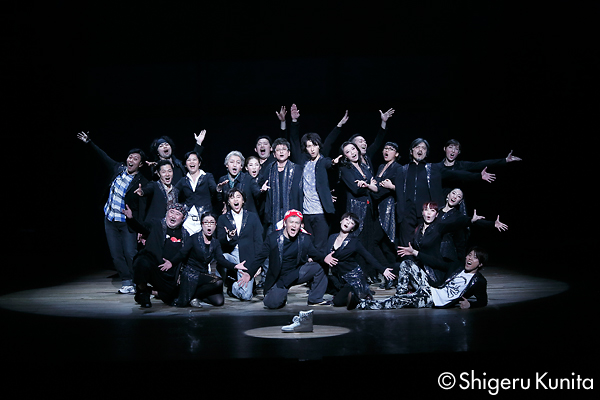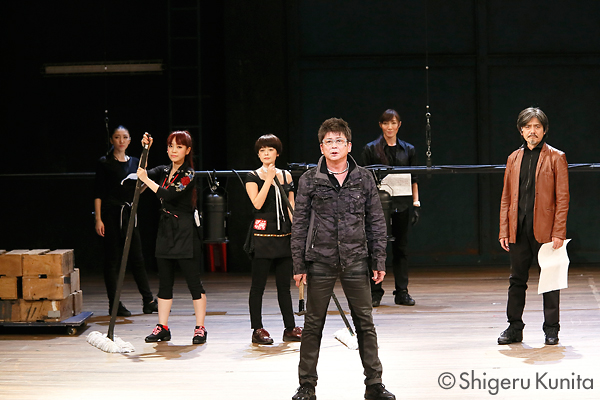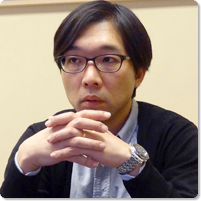The theater employee Kumakawa enters the empty stage before the set preparation begins. He announces that this theater in a regional city is named Reimei Hall, that this day will see the 1001th performance of the Broadway musical
The Horse of Doruganche
starring the famous actor Jotaro Oyamada, that the set installation is about to begin, and that this empty stage is about to be transformed into a different world.
Song #1 “
What Happened at the Theater
”
A weak-looking new stage director named Shindo appears. Song #2 “
The Old Theater
”
Formerly the assistant director for the previous stage director Kagami and recently returned from a study tour on Broadway, today is his debut as the new director. There are plenty of things to worry about, such as a change in the lead female actress, but he tells himself, “I’m going to do well.”
Three members of the Kisaragisha stage crew with a number of former delinquents with their share of idiosyncrasies and bad habits come out with vacuum cleaners on their backs like the Ghostbusters crew. Kagami, affectionately known as “big brother,” joins them and they begin to sing, “From the cover of darkness we protect the people in the spotlight.”
With the stage hands all gathered, the morning assembly begins, with the volunteer Shinya joining in. Tachikawa, who is pinch-hitting for the director’s assistant Yuri-chan, who couldn’t make it, announces that the director, who doesn’t usually come for performances, will be here today.
The setting up of the stage begins. The batten rig is lowered down. On Broadway, they call this time of dangerous work when everyone needs to wear helmets, “hard hat time,” says Tachikawa. As the work begins, the crew starts singing “
Heads Up!
” Song #3 “Hard hat time –
Heads Up!
”
The shoes that Shinya hung on a lowered batten when he was changing his
tabi
socks disappear up into the rafters when the batten is raised.
The truck that has been running late finally arrives, but due to a mix-up it has brought only half the set.
“Let’s do what we can do now.” With Kume of the Kisaragisha stage crew leading the chorus, they use leftover materials to try to finish the fortress set. Song #4 “
Do It!
”
The costume assistant, Maki, is an aspiring actress. The hand prop attendant Momoko says, There are many actors that end up being stage hands. The two sing. Song #5 “
Someday for Sure
”
Kagami’s separated wife, the actress Hikaru, who is filling in as stand-in for the leading lady, begins to argue with Kagami. In fact, she was originally cast as the lead, but and accident during rehearsals caused her to lose the role. As the former director, Kagami had long regretted that fact. Song #6 “From That Day”
Enter the lead actor Oyamada, who abruptly begins singing the lead character’s solo, #7 “
King
.” He is elderly and it looks as if senility is starting to set in.
The fortress set is finished, but they are also missing the “Horse” that appears in the last scene. The fledgling new director Shindo begins to panic.
Shinya came to Reimei Hall as a volunteer because he heard it was going to be shut down permanently. It was a nostalgic place of longing from his childhood with its showings of anime movies and hero character shows. Song #8 “
Theater
” (reprise)
The womanizing director Ebisawa makes an appearance. When he sees the makeshift set they have put together, he demands that the performance be cancelled. The producer argues back that the show will definitely go on. Song #9 “
Tickets Are Selling
”
The lofty-aired Maki also gets angry and they all tie up Ebisawa and lock him up inside the set.
It is time for the show to begin, and the curtain is raised.
Song #10 “
The Horse of Doruganche – King
”
Oyamada and Hikaru sing with the accompaniment of the chorus behind them. Shinya’s shoe(s) fall from the batten above and in response the words change to “The Shoe(s) of
Doruganche
.”
Song #11 “
The Horse of Doruganche – Last
”
In the finale, the curtain that was hiding the makeshift fortress set is raised and it reveals that one of the boards they used to finish it was an old Reimei Hall sign board. Where the chorus is supposed to sing “Doruganche,” they sing “Reimei Hall” instead. Illuminated by the lighting, the Reimei Hall sign shines brightly as the curtain falls to end the show.
The crew begins taking the set apart. With song #12 “
The Dream Is Over
”, the set crumbles down and repeats of the NG scenes are played.
The Kisaragisha stage crew’s Taki loves taking sets out after a show. Song #13 “
Take That Guy Out
”
When Taki was a young delinquent, the Kisaragisha president took him under his wing and made him a character in hero shows.
Kume carries the bitter memory of falling into a life of drunkenness and driving his wife to illness and death. Song #14 “
The Dance of Drink
”
The one that Shinya admired in the hero shows he saw as a child was the evil phantom played by Kume. “We were linked by this theater.” Song #15 “
Chain
”
Hikaru sings the same phrase as she watches the back of Kagami carrying away some tools.
Tachikawa tells Ebisawa that Yuri, who was supposed to be the director’s assistant, has gotten pregnant. Song #16 “
King
” (reprise).
Ebisawa sings, “
Foolish King, Naked King
.”
Oyamada’s recollection. Thirty years before, when he was supposed to perform
Doruganche
in this theater, a fire broke out during the performance and one of the theater staff who was guiding the audience evacuation to the end, died here. He had decided to perform here this time out of the belief that every curtain that has been raised once should be properly lowered again when the show is finished.
Knowing that this show would not have come off successfully without everyone’s help and feels down with the realization of his deficiencies. Kagami encourages him saying, “Heads Up!” Nobody can do everything by himself. Song #17 “
You’re Not Alone
”
Kagami says he will be looking for a new life now. Hikaru decides that she will continue on the stage. Song #18 “
Chain
” “
From That Day
” (reprise)
Kumakawa comes in. Shindo recognizes Kumakawa as the theater employee who helped the audience evacuate in the fire 30 years earlier. Song #19 “
What Happened at the Theater
” (reprise)
The sound of a truck arriving. The sound of the stage director’s voice rings out; “Time to carry in the set!”





